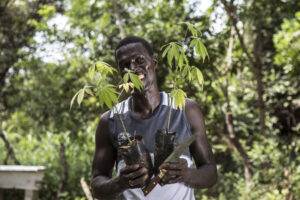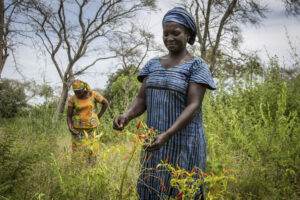Thousands of smallholder farmers in Burkina Faso will boost their food production, thanks to a new project investing in better access to and use of clean energy.
The project will provide sustainable, inclusive solutions to two challenges: increasing agricultural productivity and incomes for smallholder farmers and accelerating affordable energy access to rural communities.
The initiative is in response to the surge in demand for productive use of solar energy among farmer groups and investors in the country.
Electricity supply in Burkina Faso is unreliable, and many rural areas are still without access to power. This energy access gap has created a demand for solar power that will allow farmers to produce food efficiently and cost-effectively, especially during the off-peak or dry season.

Aleu Gomez preparing Silk Cotton tree saplings for reforestation in community forests
Over the next three years, the project will:
- Provide 1,000 systems using solar powered irrigation, solar powered milling, and solar powered cooling so that farmers can grow more food, preserve it, and gain more income for their crops.
- Ensure that 5,000 smallholder farmers achieve increased income by using clean energy.
- Attract 3 financial institutions and investors to provide access to loans to support the role out of solar systems to rural Burkina Faso
- Create an opportunity for at least three investors sign contract agreements with producers for the off take of their agricultural production.
- Install at least 1 megawatt of clean off-grid solar energy in rural Burkina Faso. That is equivalent to enough electricity to power between 164-200 homes per day in the United states.
- Contribute to the reduction of carbon (CO₂) emissions in the system. An average of 1,700 tons of greenhouse gas emissions will be reduced annually.
- Establish a knowledge exchange portal where all the market actors can share information and seek opportunities. The learnings generated will be shared on this portal.
Burkina Faso is known for its rich agricultural heritage. However, climate change means the country’s agricultural sector is struggling to keep up with the growing demand for food and water. The country has seen a decline in yields, which has led to increased food insecurityLow investments in modern equipment and the requisite solar grid systems also stagnate farming productivity.
Despite these challenges, agriculture still employs 80% of the country’s workforce and contributes nearly 28.6% of the national GDP. Smallholder producers operating on 5 acres or less account for about 80% of total agricultural production. Women account for over 50% of the farming workforce and produce more than 66% of the food consumed in-country.

Koudioube village ladies in their garden set next to the community forest so as to be able to tend their crops and to act as security for the forest
Affordable energy access remains critical to socio-economic growth, particularly in rural small-holding communities.
The Renewable Energy for Agricultural Livelihoods in Burkina Faso (REAL – BF) project will be financed by The Swedish Embassy and implemented by Practical Action.